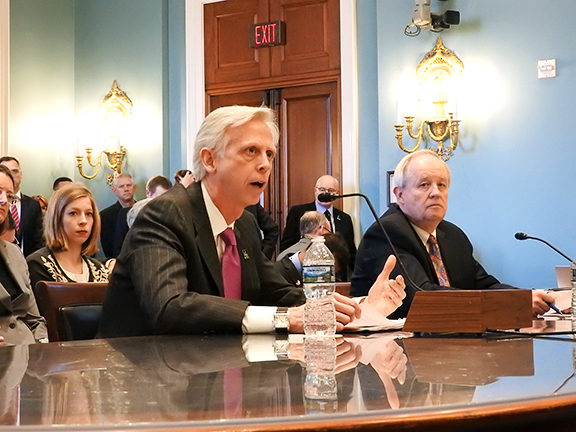NMPF President Says Stronger Dairy Program Must be Priority as Farm Bill Discussions Commence
April 7, 2017
 Congress must make it a priority to adopt badly needed improvements to the dairy safety net as soon as possible, said NMPF President and CEO Jim Mulhern at a House hearing last month on dairy policy and the upcoming farm bill.
Congress must make it a priority to adopt badly needed improvements to the dairy safety net as soon as possible, said NMPF President and CEO Jim Mulhern at a House hearing last month on dairy policy and the upcoming farm bill.
Mulhern told members of the House Agriculture Committee on March 22 that the current Margin Protection Program (MPP) contains several flaws – including a faulty calculation of the true cost of feeding dairy cattle – that need to be resolved to make the program effective and restore farmers’ faith in it. Absent the necessary changes, Mulhern said the MPP will not be the safety net that dairy farmers and Congress envisioned when it was first proposed.
“While MPP was, and is, the right approach for the future of federal dairy policy, the program in its current form does not provide meaningful safety net support to the nation’s dairy farmers,” Mulhern said. To rectify that problem, Mulhern shared with the committee the NMPF Board of Directors’ recommendations to improve the MPP, unanimously approved earlier in March.
Since its creation in the 2014 farm bill, the MPP has offered little effective support to dairy farmers, resulting in dwindling participation and diminished confidence in the program. Of the four main areas within NMPF’s package of reforms, the most important is restoring the feed cost formula to the level originally proposed by NMPF. That formula was cut by 10 percent due to erroneous cost estimates generated by the Congressional Budget Office. The resulting formula “understates the price to farmers of producing 100 pounds of milk, thereby overstating the actual margins farmers are experiencing,” Mulhern said, adding that the Agriculture Committee “got the calculation right the first time,” and thus needs to restore the MPP feed formula to its original level.
Mulhern’s testimony also addressed an issue of great concern to many in the dairy community: the need for immigration reform. Because the seasonal H-2A visa program does not apply to dairy farms with their year-round demand for labor, Congress must provide the agriculture industry with an effective guest worker program to meet its future needs, while also providing a way to address current workers with improper documentation.
“Without access to a steady and reliable workforce, our industry will not be able to survive, let alone thrive, in the future,” Mulhern said.
He also emphasized the critical importance of dairy trade policy, highlighting the U.S. dairy industry’s strong relationship with Mexico while chastising Canada for implementing a pricing policy designed to block American dairy imports.
Mulhern also stressed the need for strong congressional support of the DAIRY PRIDE Act, introduced in the House and Senate in January. Plant-based alternatives lack real milk’s consistent and high levels of nutrition, he said, and in the absence of proper labeling enforcement, increasing numbers of nutritionally inferior dairy imitators will continue to create confusion for consumers in the marketplace.






